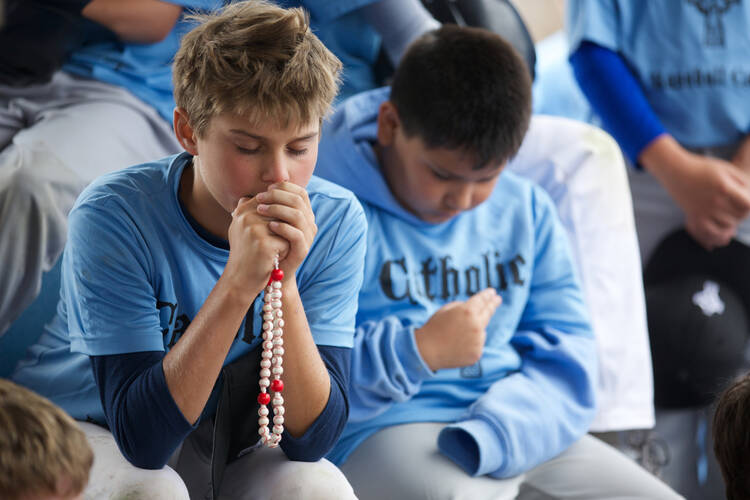It may be time for détente between youth-oriented programs and parishes.
I offer this suggestion after hearing about a parish on Long Island which prepared a sixth grade reconciliation service for its religious education students. Only two-thirds of the expected students showed up. The reason? The service conflicted with a play rehearsal at the local public school that the religious education director had not been informed of.
The story is a variation of others, for example, of sports practices that conflict with weekend Masses and coaches who threaten that little athletes won’t play in the next big game if they miss a practice. How’s that for setting up conflict in the home if parents want to attend Mass as a family?
The late Cardinal John O’Connor once complained he was losing altar servers to Little League. (I think Little League won in that skirmish.)
Some dioceses have found ways around the problem. In some school districts in North Dakota, for example, church officials work with local school boards and officials to keep Wednesday evenings after 5 p.m. free of all sports and other school activities. These evenings then become nights for religious education. Others have tried to do the same on Sunday mornings with less success, as school officials counter that there are lots of Masses from late Saturday afternoon to Sunday night when families might attend church together.
The various clubs outside school for dance and additional soccer, lacrosse and other team sports add to the problem. School championship marching bands that travel during Holy Week also challenge families that seek to celebrate the Triduum.
A number of principles for achieving détente come to mind.
- Avoid draconian positions on both sides. No “If a parent does not attend the sacramental preparation class for Baptism, First Eucharist or Confirmation, there is no sacrament for the child.” Nor, on the other hand, “anyone who misses practice can’t play.”
- Show respect for both church services and the value of sports. A pastor who shows up at a game or refers to the youth sports at Mass shows relevance and wins points. A coach who respects religious values has a strong teaching tool as he works to develop sportsmanship and honor among players. Some parishes make the early Sunday Mass one where young players wear their uniforms and get a special blessing on game day.
- Set good example right from home. Parents who do not go to Mass themselves undercut any argument they have that religious education and Mass attendance are vital for their children.
- Have the decency not to make children pawns in a power struggle between parents, coaches and pastors. Offer options, for example, by offering make-up classes and occasional home schooling in parish sacramental preparation programs when conflicts arise.
- Model healthy ways to resolve conflicts. When faced with conflicts between two goods, such as religion and sports, prove there is room for both. Such conflicts will come up throughout family life, for example, over where to celebrate holidays as the children grow older. Do sacrifices sometimes have to be made?
- Take the long view. What lessons will go further in the education and development of children?
The conflict does not appear to be on the wane as interest in sports grows and hopes for scholarships for would-be stars increase. The problem also fits into an overall challenge the church faces in the struggle to help people hear God in a world filled with distractions from Him.
Mary Ann Walsh, R.S.M., is a member of the Northeast Community of the Sisters of Mercy of the Americas and U.S. Church Correspondent for America.








